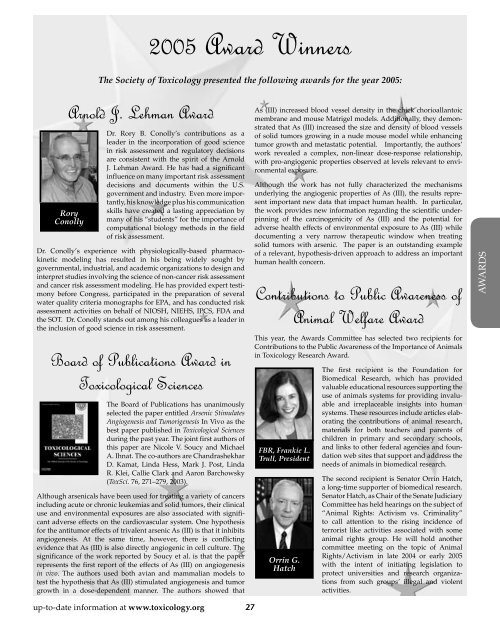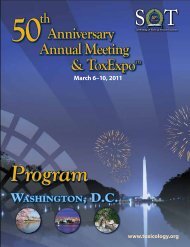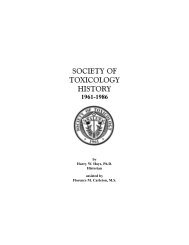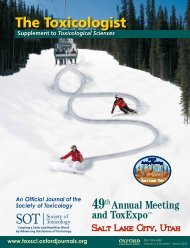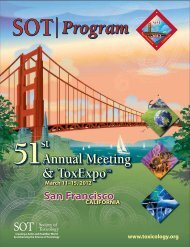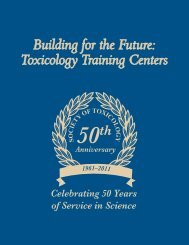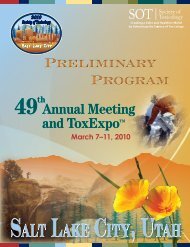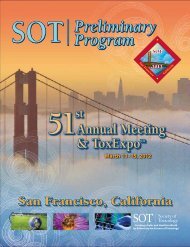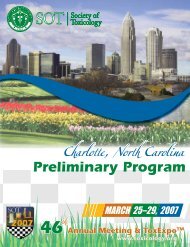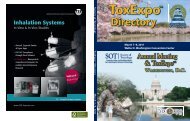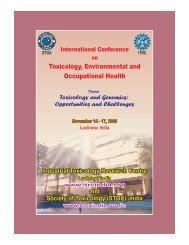Program - Society of Toxicology
Program - Society of Toxicology
Program - Society of Toxicology
Create successful ePaper yourself
Turn your PDF publications into a flip-book with our unique Google optimized e-Paper software.
2005 Award Winners<br />
The <strong>Society</strong> <strong>of</strong> <strong>Toxicology</strong> presented the following awards for the year 2005:<br />
Arnold J. Lehman Award<br />
Rory<br />
Conolly<br />
Dr. Rory B. Conolly’s contributions as a<br />
leader in the incorporation <strong>of</strong> good science<br />
in risk assessment and regulatory decisions<br />
are consistent with the spirit <strong>of</strong> the Arnold<br />
J. Lehman Award. He has had a significant<br />
influence on many important risk assessment<br />
decisions and documents within the U.S.<br />
government and industry. Even more importantly,<br />
his knowledge plus his communication<br />
skills have created a lasting appreciation by<br />
many <strong>of</strong> his “students” for the importance <strong>of</strong><br />
computational biology methods in the field<br />
<strong>of</strong> risk assessment.<br />
Dr. Conolly’s experience with physiologically-based pharmacokinetic<br />
modeling has resulted in his being widely sought by<br />
governmental, industrial, and academic organizations to design and<br />
interpret studies involving the science <strong>of</strong> non-cancer risk assessment<br />
and cancer risk assessment modeling. He has provided expert testimony<br />
before Congress, participated in the preparation <strong>of</strong> several<br />
water quality criteria monographs for EPA, and has conducted risk<br />
assessment activities on behalf <strong>of</strong> NIOSH, NIEHS, IPCS, FDA and<br />
the SOT. Dr. Conolly stands out among his colleagues as a leader in<br />
the inclusion <strong>of</strong> good science in risk assessment.<br />
Board <strong>of</strong> Publications Award in<br />
Toxicological Sciences<br />
The Board <strong>of</strong> Publications has unanimously<br />
selected the paper entitled Arsenic Stimulates<br />
Angiogenesis and Tumorigenesis In Vivo as the<br />
best paper published in Toxicological Sciences<br />
during the past year. The joint first authors <strong>of</strong><br />
this paper are Nicole V. Soucy and Michael<br />
A. Ihnat. The co-authors are Chandrashekhar<br />
D. Kamat, Linda Hess, Mark J. Post, Linda<br />
R. Klei, Callie Clark and Aaron Barchowsky<br />
(ToxSci. 76, 271–279, 2003).<br />
Although arsenicals have been used for treating a variety <strong>of</strong> cancers<br />
including acute or chronic leukemias and solid tumors, their clinical<br />
use and environmental exposures are also associated with significant<br />
adverse effects on the cardiovascular system. One hypothesis<br />
for the antitumor effects <strong>of</strong> trivalent arsenic As (III) is that it inhibits<br />
angiogenesis. At the same time, however, there is conflicting<br />
evidence that As (III) is also directly angiogenic in cell culture. The<br />
significance <strong>of</strong> the work reported by Soucy et al. is that the paper<br />
represents the first report <strong>of</strong> the effects <strong>of</strong> As (III) on angiogenesis<br />
in vivo. The authors used both avian and mammalian models to<br />
test the hypothesis that As (III) stimulated angiogenesis and tumor<br />
growth in a dose-dependent manner. The authors showed that<br />
As (III) increased blood vessel density in the chick chorioallantoic<br />
membrane and mouse Matrigel models. Additionally, they demonstrated<br />
that As (III) increased the size and density <strong>of</strong> blood vessels<br />
<strong>of</strong> solid tumors growing in a nude mouse model while enhancing<br />
tumor growth and metastatic potential. Importantly, the authors’<br />
work revealed a complex, non-linear dose-response relationship,<br />
with pro-angiogenic properties observed at levels relevant to environmental<br />
exposure.<br />
Although the work has not fully characterized the mechanisms<br />
underlying the angiogenic properties <strong>of</strong> As (III), the results represent<br />
important new data that impact human health. In particular,<br />
the work provides new information regarding the scientific underpinning<br />
<strong>of</strong> the carcinogenicity <strong>of</strong> As (III) and the potential for<br />
adverse health effects <strong>of</strong> environmental exposure to As (III) while<br />
documenting a very narrow therapeutic window when treating<br />
solid tumors with arsenic. The paper is an outstanding example<br />
<strong>of</strong> a relevant, hypothesis-driven approach to address an important<br />
human health concern.<br />
Contributions to Public Awareness <strong>of</strong><br />
Animal Welfare Award<br />
This year, the Awards Committee has selected two recipients for<br />
Contributions to the Public Awareness <strong>of</strong> the Importance <strong>of</strong> Animals<br />
in <strong>Toxicology</strong> Research Award.<br />
FBR, Frankie L.<br />
Trull, President<br />
Orrin G.<br />
Hatch<br />
The first recipient is the Foundation for<br />
Biomedical Research, which has provided<br />
valuable educational resources supporting the<br />
use <strong>of</strong> animals systems for providing invaluable<br />
and irreplaceable insights into human<br />
systems. These resources include articles elaborating<br />
the contributions <strong>of</strong> animal research,<br />
materials for both teachers and parents <strong>of</strong><br />
children in primary and secondary schools,<br />
and links to other federal agencies and foundation<br />
web sites that support and address the<br />
needs <strong>of</strong> animals in biomedical research.<br />
The second recipient is Senator Orrin Hatch,<br />
a long-time supporter <strong>of</strong> biomedical research.<br />
Senator Hatch, as Chair <strong>of</strong> the Senate Judiciary<br />
Committee has held hearings on the subject <strong>of</strong><br />
“Animal Rights: Activism vs. Criminality”<br />
to call attention to the rising incidence <strong>of</strong><br />
terrorist like activities associated with some<br />
animal rights group. He will hold another<br />
committee meeting on the topic <strong>of</strong> Animal<br />
Rights/Activism in late 2004 or early 2005<br />
with the intent <strong>of</strong> initiating legislation to<br />
protect universities and research organizations<br />
from such groups’ illegal and violent<br />
activities.<br />
AWARDS<br />
up-to-date information at www.toxicology.org 27


